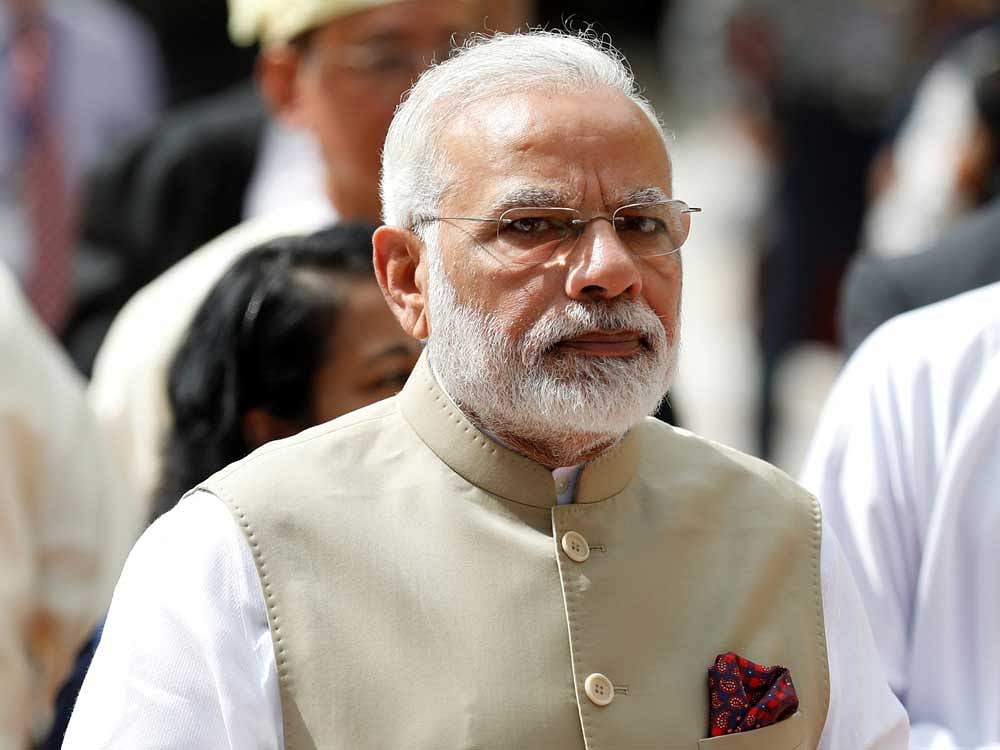
Political columnists in India generally identify political leaders with their party ideologies, without stopping to wonder if there may not be conflict within a political party regardless of the ideology it professes.
If one considers the careers of the biggest leaders of the 20th century, for instance, one finds that most of them became powerful after decimating the opposition within their own parties.
Hitler had a tussle for power in which he liquidated his rivals within; Stalin decimated the Communist Party of the Soviet Union in the 1930s to assume absolute control; and, Indira Gandhi towered over Congress by weakening the party by removing rivals within her own faction, like the Young Turks.
The BJP came to power in 2014 after Narendra Modi manoeuvred his way to the top, side-lining leaders like LK Advani, in the process. Modi was the BJP’s poster boy in 2014 and he rode to power on a ‘development’ platform, which was different from the Hindutva plank generally relied upon by the seniors.
After he became prime minister, his most noteworthy acts were the November 2016 currency demonetisation and the implementation of GST, both unpopular with the business segment that had once been the BJP’s vote bank.
Modi courted other electoral groups, like youth, to whom his development plank held promise. When the BJP came to power in Maharashtra, he installed Devendra Fadnavis, a young politician with a clean image but with no constituency of his own, as chief minister.
In the last couple of years, however, Modi appears to have lost ground. He allowed a die-hard Hindutva fanatic like Yogi Adityanath to become chief minister in Uttar Pradesh; he has not acted when cow vigilantes have run amuck and has not taken his chief ministers to task when lynch mobs have gone on the rampage; the plea that law and order is a ‘state subject’ is too weak to carry weight since ‘state subjects’ are routinely invoked on other occasions, like elections.
As a last straw, one of his more sophisticated ministers, Jayant Sinha, had himself photographed felicitating convicted members of a lynch mob who were out on bail on appeal. Sinha is a former investment banker with an IIT and Harvard pedigree and hardly seems the kind to associate with base elements; he could not have acted thus without being under pressure from the party or its fringe.
The plea that the BJP is against vigilantism and that the group of convicted lynchers were felicitated because the high court had given them bail upon appeal and so they were to be deemed innocent does not carry conviction. The political message that went out, especially to other cow vigilantes and party cadres, is that getting away, even if only on bail, despite their crime was to be celebrated.
The BJP, in effect, admitted that lynch mobs are its own people, something Modi might not have let out in 2016, when he made his only plea so far against cow vigilantes, calling them “part-time criminals”. Ahead of 2019 polls, he doesn’t seem to mind.
One does not also hear the word ‘development’ from him nowadays, and evidence points to Modi, who might have been expected to dominate the party, having succumbed. He is still popular, but his reactive avatar is likely to erode it. Mockery of one’s opponents does not set the polls on fire, but that’s what he is chiefly doing. There is tight control over communications issuing forth from the PM, but speculation about what is happening is still possible.
Neglect of intellectuals
An act of significance that could help us is the PM’s neglect of intellectuals. Many economists saw Modi as a possible economic/political messiah, but he kept them at a distance. Since then, economists and academics who were expecting to be welcomed in order to forge a new India have returned to the US, the last being chief economic adviser Arvind Subramanian.
Modi is said to be a good listener, but a distrust of highly-educated people betray his contempt for what he deems to be ‘bookish knowledge’. Perhaps he only gives intellectuals a hearing to confirm (to himself) the superiority of knowledge acquired through experience over that found in books.
The BJP and the Parivar are not rich in intellectuals and thinkers. They have not been even able to update the party’s traditional thought (Savarkar, Golwalkar, Upadhyaya) to make it pertinent to the global age.
One could conjecture from this that the Parivar has no new ideas and this is hampering Modi. The fact that he has no one in his cabinet who does not submit to him unquestioningly should also be factored in here.
All this points to Modi being much weaker in reality than his admirers take him to be — and he was primarily eulogised for his perceived strength. His rivals within the Parivar (like the RSS) may be reassured, but it does not bode well for the party since it so completely relies on him for 2019.